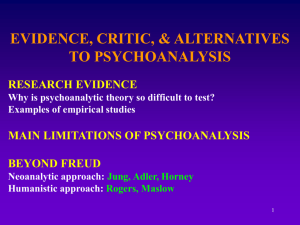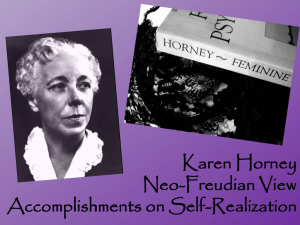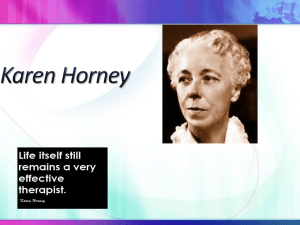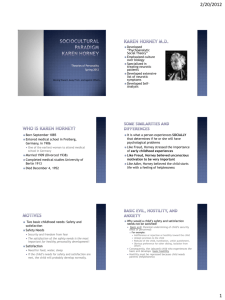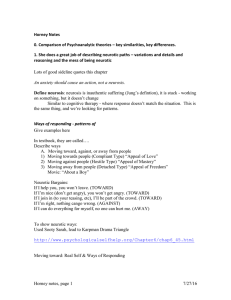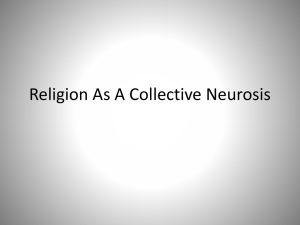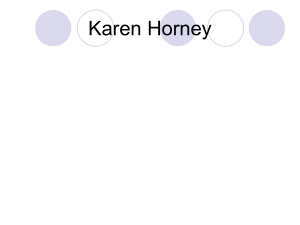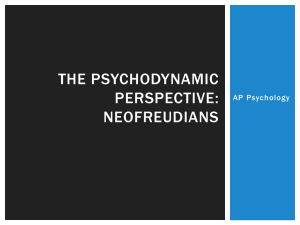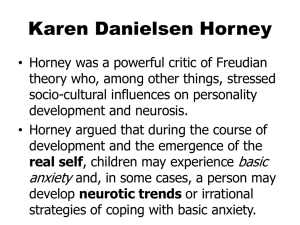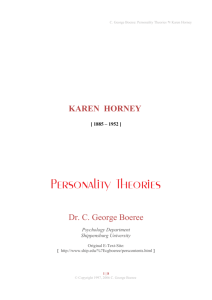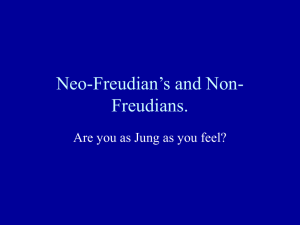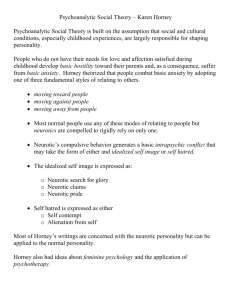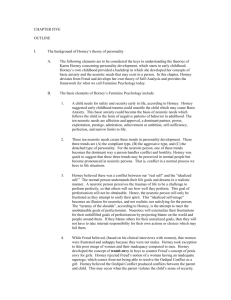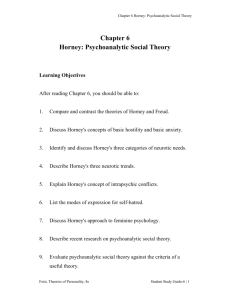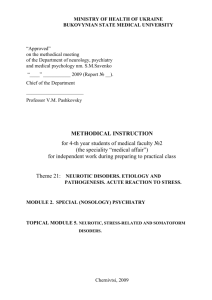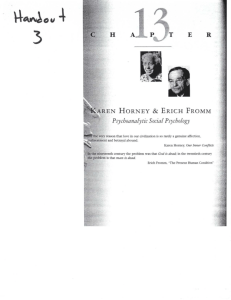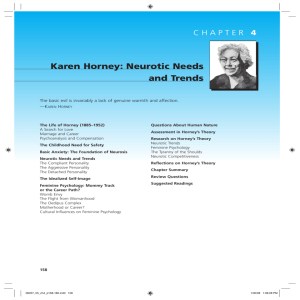Psychodynamic - Plain Local Schools
advertisement
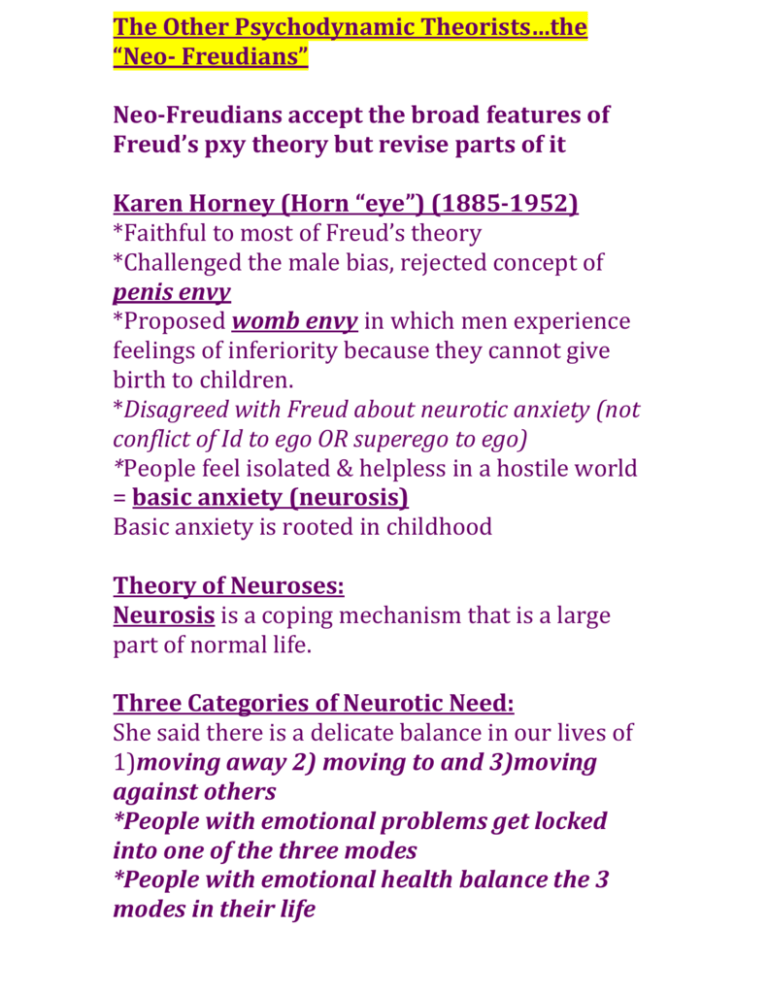
The Other Psychodynamic Theorists…the “Neo- Freudians” Neo-Freudians accept the broad features of Freud’s pxy theory but revise parts of it Karen Horney (Horn “eye”) (1885-1952) *Faithful to most of Freud’s theory *Challenged the male bias, rejected concept of penis envy *Proposed womb envy in which men experience feelings of inferiority because they cannot give birth to children. *Disagreed with Freud about neurotic anxiety (not conflict of Id to ego OR superego to ego) *People feel isolated & helpless in a hostile world = basic anxiety (neurosis) Basic anxiety is rooted in childhood Theory of Neuroses: Neurosis is a coping mechanism that is a large part of normal life. Three Categories of Neurotic Need: She said there is a delicate balance in our lives of 1)moving away 2) moving to and 3)moving against others *People with emotional problems get locked into one of the three modes *People with emotional health balance the 3 modes in their life She identified ten neuroses: Examples: *Need for power *Need for affection *Need for social prestige *Need for independence. Carl Jung (1875-1961) Former student of Freud Use the AP Book to answer Jung Questions today in class, page 532-533 Alfred Adler (1870-1937) Former student of Freud Use your book to answer Adler questions today in class or if needed finish for HMWK, page 276 Karen Horney: Neo-Freudian Timeline of Her Life: Karen Horney was born in Germany on September 16, 1885. 1906 - Entered medical school. 1909 - Married law student Oscar Horney. 1911 - Horney's mother died. 1926 - Horney left her husband and moved to the U.S. 1942 - Published Self-Analysis She died on December 4, 1952. Psychoanalytic theorist Karen Horney developed one of the best known theories of neurosis. She believed that neurosis resulted from basic anxiety caused by interpersonal relationships. Her theory proposes that strategies used to cope with anxiety can be overused, causing them to take on the appearance of needs. According to Horney, basic anxiety (and therefore neurosis) could result from a variety of things including, " . . . direct or indirect domination, indifference, erratic behavior, lack of respect for the child's individual needs, lack of real guidance, disparaging attitudes, too much admiration or the absence of it, lack of reliable warmth, having to take sides in parental disagreements, too much or too little responsibility, over-protection, isolation from other children, injustice, discrimination, unkept promises, hostile atmosphere, and so on and so on" (Horney, 1945). These 10 neurotic needs can be classed into three broad categories: 1. Needs that move you towards others. These neurotic needs cause individuals to seek affirmation and acceptance from others and are often described as needy or clingy as they seek out approval and love. 2. Needs that move you away from others. These neurotic needs create hostility and antisocial behavior. These individuals are often described as cold, indifferent, and aloof. 3. Needs that move you against others. These neurotic needs result in hostility and a need to control other people. These individuals are often described as difficult, domineering, and unkind. 1. The Neurotic Need for Affection and Approval This needs include the desires to be liked, to please other people, and meet the expectations of others. People with this type of need are extremely sensitive to rejection and criticism and fear the anger or hostility of others. 2. The Neurotic Need for a Partner Who Will Take Over One’s Life These involve the need to be centered on a partner. People with this need suffer extreme fear of being abandoned by their partner. Oftentimes, these individuals place an exaggerated importance on love and believe that having a partner will resolve all of life’s troubles. 3. The Neurotic Need to Restrict One’s Life Within Narrow Borders Individuals with this need prefer to remain inconspicuous and unnoticed. They are undemanding and content with little. They avoid wishing for material things, often making their own needs secondary and undervaluing their own talents and abilities. 4. The Neurotic Need for Power Individuals with this need seek power for its own sake. They usually praise strength, despise weakness, and will exploit or dominate other people. These people fear personal limitations, helplessness, and uncontrollable situations. 5. The Neurotic Need to Exploit Others These individuals view others in terms of what can be gained through association with them. People with this need generally pride themselves in their ability to exploit other people and are often focused on manipulating others to obtain desired objectives, including such things as ideas, power, money, or sex. 6. The Neurotic Need for Prestige Individuals with a need for prestige value themselves in terms of public recognition and acclaim. Material possessions, personality characteristics, professional accomplishments, and loved ones are evaluated based upon prestige value. These individuals often fear public embarrassment and loss of social status. 7. The Neurotic Need for Personal Admiration Individuals with a neurotic need for personal admiration are narcissistic and have an exaggerated self-perception. They want to be admired based on this imagined self-view, not upon how they really are. 8. The Neurotic Need for Personal Achievement According to Horney, people push themselves to achieve greater and greater things as a result of basic insecurity. These individuals fear failure and feel a constant need to accomplish more than other people and to top even their own earlier successes. 9. The Neurotic Need for Self-Sufficiency and Independence These individuals exhibit a “loner” mentality, distancing themselves from others in order to avoid being tied down or dependent upon other people. 10. The Neurotic Need for Perfection and Unassailability These individuals constantly strive for complete infallibility. A common feature of this neurotic need is searching for personal flaws in order to quickly change or cover up these perceived imperfections. Psychodynamic: Neo-Freudians Name:________________________ Carl Jung: 1. According to Jung a __________________ or _________________ exists between the ego and the outside world. 2. Define the term in the first blank in question #1. 3. The actions of the ego may reflect attitudes of _______________(_____________________ 4. _____________) or of _____________________(__________________________________). 5. Define personal unconscious. 6. Define collective unconscious and list 5 examples. 7. According to Jung what is an archetype? 8. What are the two particularly important types of archetypes? 9. Compare Freud’s view to Jung’s: A man dreams of dancing with his sister. What would Freud say this guy’s dream signifies? What would Adler say the dream signifies? 10. According to Jung what is the most important archetype of all? What does it represent? 11. According to Jung, how do we become richer and more completely human? 12. Jung was the first to use the term ____________________________ to describe a striving for completion and unity. Alfred Adler: 13. Adler believed the driving force of people’s lives is a desire to __________________________________________________________. 14. Everyone struggles with_______________________. 15. A person who continually tries to compensate for their weakness and avoid feelings of inadequacy as having an _____________________ __________________. 16. According to Adler, what is the effect of overpampering on children’s personality development? 17. According to Adler, what is the effect of a neglectful parent on a child’s personality developmet? 18. Whether neglected or overpampered, children experiencing one of these household dynamics as a child will grow up to ____________________________________________________________. Other Neo-Freudians: 19. ___________________________accepted Freud’s basic theory, but outlines eight stages psychosocial stages that every person goes through from birth to death. 20. Karen Horney theorized that people control basic anxiety by moving toward, away from, and ____________________ others.
